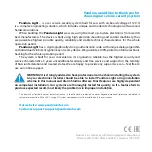
16
9.2. PLANNING YOUR ESCAPE ROUTE FOR WHEN THE
ALARM GOES OFF
1. Check room doors for heat or
smoke. Do not open a hot door.
Use an alternate escape route.
Close doors behind you as you
leave.
2. If smoke is heavy, crawl out,
staying close to floor. Take short
breaths, if possible, through a wet
cloth or hold your breath. More
people die from smoke inhalation
than from flames.
3. Get out as fast as you can.
Do not stop for packing. Have
a prearranged meeting place
outside for all family members.
Check everybody is there.
4. Call the Fire Brigade from a
neighbour’s house or mobile
phone. Remember to give your
name and address.
5. NEVER re-enter a burning
house.
10. SMOKE ALARM & RF LIMITATIONS
10.1 Limitations of Smoke Alarms
Smoke Alarms have significantly helped to reduce the number
of fire fatalities in countries where they are widely installed.
However independent authorities have stated that they may
be ineffective in some circumstances. There are a number of
reasons for this:
• Smoke Alarms will not work if the batteries are depleted or
if they are not connected. Test regularly and replace the
entire unit when it fails to operate.
• Smoke Alarms will not detect fire if sufficient smoke does
not reach the alarm. Smoke may be prevented from
reaching the Alarm if the fire is too far away, for example,
if the fire is on another floor, behind a closed door, in a
chimney, in a wall cavity, or if the prevailing air draughts




































